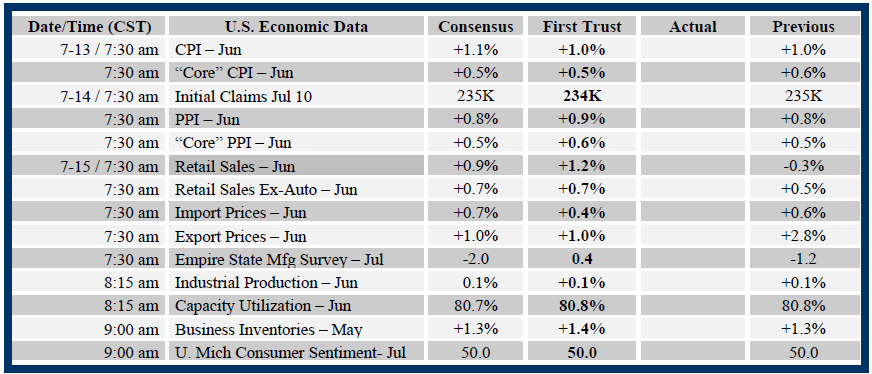First Trust Monday Morning Outlook
Brian S. Wesbury – Chief Economist
Robert Stein, CFA – Dep. Chief Economist
Strider Elass – Senior Economist
Andrew Opdyke, CFA – Senior Economist
Bryce Gill – Economist
Some investors think the US is already in a recession. As we wrote two weeks ago and as recent data have confirmed, we don’t think that’s the case.
Industrial production is up at a rapid pace so far this year, while payrolls have expanded at a monthly pace of 457,000 and the unemployment rate has dropped to 3.6% from 3.9%. Real gross domestic income (Real GDI), a companion to real GDP that is just as accurate, but which arrives a month later, rose at a 1.8% annualized rate in Q1.
Nonetheless, the recession story is out there and some claim adjustable-rate mortgage resets are going to knock the economic legs out from under consumers. The idea is that with the Fed raising rates rapidly, as the rate on adjustable mortgages reset, homeowners are going to have to make higher payments, which means less money to spend on other goods and services.
Let’s start off by noting the most basic problem with this theory, which is that even if mortgage resets increase some families’ payments, the holders of those mortgages will get the extra payments and their purchasing power will increase. On net, purchasing power should remain unchanged.
But, to be cautious, let’s indulge the reset theory by pretending the extra payments are money that just disappears, with no one on the other side of the transaction. Even then, our calculations show the theory doesn’t add up.
Households have about $12 trillion in mortgage debt, according to the Federal Reserve, so, yes, the top-line number sounds scary. But, according to the Federal Housing Finance Agency, only 3.7% of these loans are adjustable, or about $450 billion. Now let’s say that one-third of these mortgages reset every year. That’s $150 billion worth of mortgages resetting. Still a big number, still potentially scary.
But when we calculate how much a reset would change the payments on these loans the problem suddenly gets much smaller. An extra two percentage points in interest on $150 billion in debt is $3 billion.
Obviously, the people making these extra $3 billion in payments won’t like it. But the extra payments equal only 0.018% of annualized consumer spending. That’s not a typo. Not 1%, not 0.1%, but only 0.018%. Which means that even if all of the $450 billion in adjustable-rate mortgages reset upward by two percentage points at the same time, we’d be talking about 0.05% of annual consumer spending.
The bottom line is that we think a recession is eventually on the way because monetary policy will have to get tight enough to wrestle inflation back down and that should be tight enough to cause a recession starting in late 2023 or beyond. But those rate hikes won’t work like they did in 2006-07 when nearly half of all mortgages were adjustable in ‘05. The mortgage reset story makes superficial sense. But when you work through the actual numbers, it’s not something to worry about.
The attached information was developed by First Trust, an independent third party. The opinions are of the listed authors at First Trust Advisors L.P, and are independent from and not necessarily those of RJFS or Raymond James. All investments are subject to risk. There is no guarantee that these statements, opinions, or forecasts provided in the attached article will prove to be correct. Individual investor's results will vary. Past performance does not guarantee future results. Forward looking data is subject to change at any time and there is no assurance that projections will be realized. Any information provided is for informational purposes only and does not constitute a recommendation. Investing involves risk and you may incur a profit or loss regardless of strategy selected.

